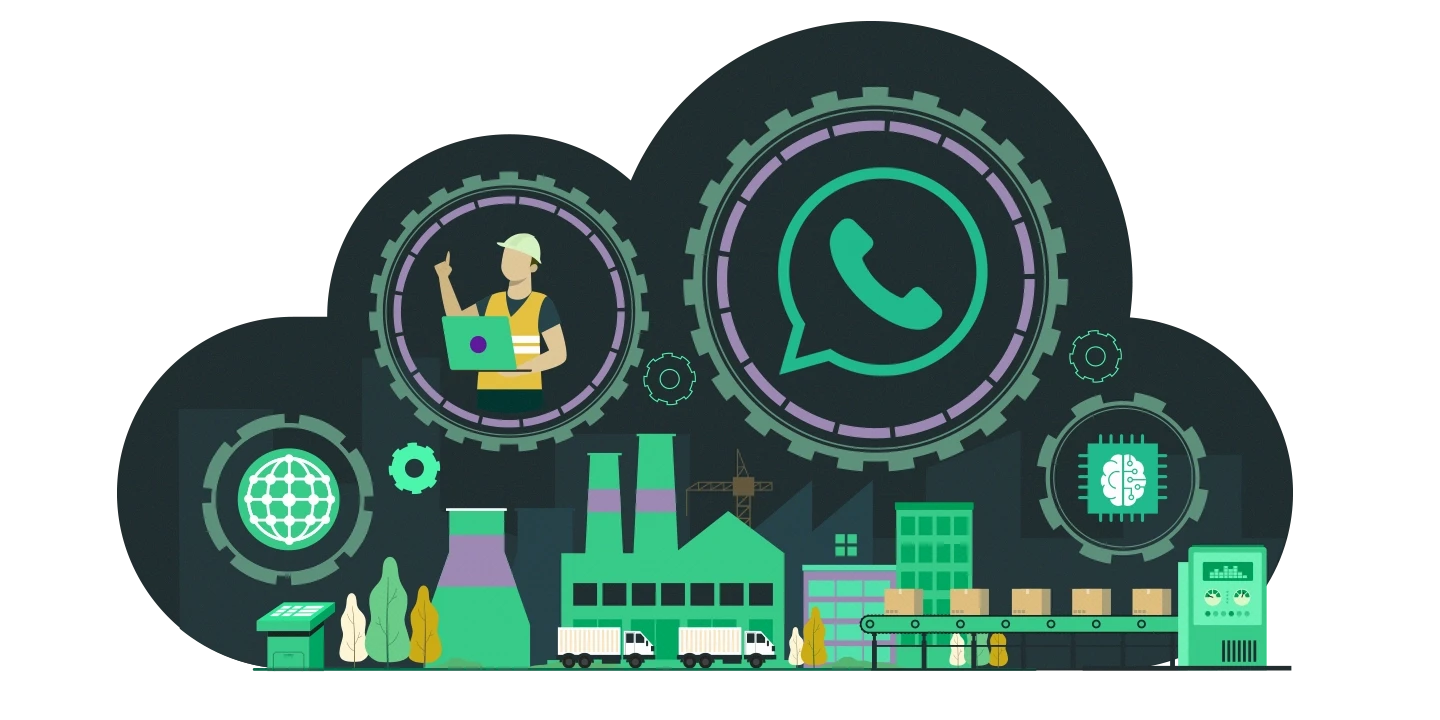
October 24, 2024
How to optimize industry communication with WhatsApp?
The application streamlines internal processes and promotes integration between sectors.

October 24, 2024
How to optimize industry communication with WhatsApp?
The application streamlines internal processes and promotes integration between sectors.

October 24, 2024
How to optimize industry communication with WhatsApp?
The application streamlines internal processes and promotes integration between sectors.
The Marketing and Sales Panorama 2024, held by RD Station, shows that at least 70% of Brazilian companies use WhatsApp for internal and external communications and that the channel has the highest success rate in returns, surpassing interactions through in-person visits and phone calls.
This strong adherence to the messaging app can be explained by the omnipresence of WhatsApp in people's routines, the maturity of the market, and the practicality that the platform provides, as communication occurs regardless of where users are located.
Also, read: WhatsApp in companies: how to formalize?
In the industry, WhatsApp plays an important role in the relationship between departments, facilitating employees' access to institutional information, simplifying the dissemination of this information, which certainly greatly contributes to improving performance and results.

Why is WhatsApp important for the industry?
Intranet, emails, and bulletin boards have always been used for internal communication in corporations to issue announcements about events, changes in work routines, or any information useful for the proper functioning of the company. However, these tools have become limited over time, as the operational dynamics of organizations have drastically changed post-pandemic.
Today, with part of the industry working remotely, from their own devices, there is no longer a need for network connections or even the obligation to formalize messages via email. WhatsApp has begun to aggregate these functions more simply and expanded communication possibilities between employees and third parties.
Through corporate WhatsApp, it has become easier to:
Simultaneously inform a large number of people through broadcast lists without users seeing each other’s contacts;
Record dialogues, requests, and feedback from evaluations;
Share documents, spreadsheets, contracts, audio and video files with multiple people at once, without needing to forward messages individually;
Make audio and video calls and hold real-time meetings with up to 32 users simultaneously;
Create groups for each department of the company to align deadlines and task execution, as well as to update the status of each operation;
Also, read: WhatsApp groups at work: rules for bosses and employees
Create communities and bring together groups from various sectors;
Conduct polls with users;
Promote greater integration between departments and professionals;
Make group decisions without the need for everyone to be in the same place at the same time.
WhatsApp has reduced geographical distances, brought employees closer to managers, and increased operational speed as it has sped up communication. But what to do with the messages exchanged on the app regarding work? How to ensure data confidentiality and prevent leaks?

Before implementing communication via WhatsApp in an industry, where professionals of all levels and with different responsibilities operate, it is essential to prepare training on ethics, digital etiquette rules, professional conduct, language to be used in messages, types of material that cannot be shared, and mainly, about privacy and data confidentiality.
In parallel to this initiative, to aid in controlling the content disseminated through the app, monitoring conversations through the company's WhatsApp is an effective strategy that also minimizes the risks of misconduct, violations of company policies, and data leaks.
Also, read: Main doubts about monitoring corporate WhatsApp
In Brazil, there is already a solution in this regard, which is Zapper. With the tool, the company monitors all corporate accounts and devices, ensuring the accuracy and integrity of the information disseminated by WhatsApp.
Use cases of monitoring for the industry
Controlling the level of interactions through WhatsApp, preventing conflicts, and promoting healthy interaction among users can be a challenge for large corporations, with large employee bases and, consequently, a huge volume of daily messages.
Monitoring dialogues through WhatsApp with Zapper aids in managing this communication, being able to identify, through keywords, conversations indicative of misconduct, violations of company policies, bullying, and harassment. With real-time supervision of interactions, the manager can intervene immediately.
Also, read: Corporate WhatsApp monitoring is an effective tool against harassment in companies
All captured conversations are recorded and saved in the cloud and even if a user wants to delete a dialogue or parts of it, the material remains archived in full for future reference. Cloud storage ensures exclusive access and data security for an indefinite period.

Each department of the company can benefit from monitoring conversations on WhatsApp with Zapper:
HR can detect relationship problems within the team and work towards reconciling the parties involved. Additionally, it can identify among the managers, abuses of authority and regulate work during business hours, avoiding labor lawsuits due to actions outside of working hours;
The marketing segment of the company can use monitoring to check the approach of attendants with customers and verify the most effective arguments and promotional campaigns;
The legal department can monitor conversations to ensure compliance with the organization's compliance policies, among all users;
Thanks to Zapper's Analytics feature, it is possible to collect all monitored information and organize it in a segmented manner in qualitative reports. The customer relationship department can access the reports generated by the platform and check the best times to contact customers, tabulate consumer impressions, identify points for improvement in the company's logistics, and also evaluate employee service and customer satisfaction rates.
Also, read: Transform data into decisions with the help of WhatsApp
From the moment WhatsApp arrives at organizations to enhance communication and improve the productivity of the company, Zapper arrives to extract relevant data from the interactions that occur on the app and transform them into valuable strategies! The only possible outcome with the combination of these resources is success!
Join this team!
Click here to schedule a demonstration of the tool.
The Marketing and Sales Panorama 2024, held by RD Station, shows that at least 70% of Brazilian companies use WhatsApp for internal and external communications and that the channel has the highest success rate in returns, surpassing interactions through in-person visits and phone calls.
This strong adherence to the messaging app can be explained by the omnipresence of WhatsApp in people's routines, the maturity of the market, and the practicality that the platform provides, as communication occurs regardless of where users are located.
Also, read: WhatsApp in companies: how to formalize?
In the industry, WhatsApp plays an important role in the relationship between departments, facilitating employees' access to institutional information, simplifying the dissemination of this information, which certainly greatly contributes to improving performance and results.

Why is WhatsApp important for the industry?
Intranet, emails, and bulletin boards have always been used for internal communication in corporations to issue announcements about events, changes in work routines, or any information useful for the proper functioning of the company. However, these tools have become limited over time, as the operational dynamics of organizations have drastically changed post-pandemic.
Today, with part of the industry working remotely, from their own devices, there is no longer a need for network connections or even the obligation to formalize messages via email. WhatsApp has begun to aggregate these functions more simply and expanded communication possibilities between employees and third parties.
Through corporate WhatsApp, it has become easier to:
Simultaneously inform a large number of people through broadcast lists without users seeing each other’s contacts;
Record dialogues, requests, and feedback from evaluations;
Share documents, spreadsheets, contracts, audio and video files with multiple people at once, without needing to forward messages individually;
Make audio and video calls and hold real-time meetings with up to 32 users simultaneously;
Create groups for each department of the company to align deadlines and task execution, as well as to update the status of each operation;
Also, read: WhatsApp groups at work: rules for bosses and employees
Create communities and bring together groups from various sectors;
Conduct polls with users;
Promote greater integration between departments and professionals;
Make group decisions without the need for everyone to be in the same place at the same time.
WhatsApp has reduced geographical distances, brought employees closer to managers, and increased operational speed as it has sped up communication. But what to do with the messages exchanged on the app regarding work? How to ensure data confidentiality and prevent leaks?

Before implementing communication via WhatsApp in an industry, where professionals of all levels and with different responsibilities operate, it is essential to prepare training on ethics, digital etiquette rules, professional conduct, language to be used in messages, types of material that cannot be shared, and mainly, about privacy and data confidentiality.
In parallel to this initiative, to aid in controlling the content disseminated through the app, monitoring conversations through the company's WhatsApp is an effective strategy that also minimizes the risks of misconduct, violations of company policies, and data leaks.
Also, read: Main doubts about monitoring corporate WhatsApp
In Brazil, there is already a solution in this regard, which is Zapper. With the tool, the company monitors all corporate accounts and devices, ensuring the accuracy and integrity of the information disseminated by WhatsApp.
Use cases of monitoring for the industry
Controlling the level of interactions through WhatsApp, preventing conflicts, and promoting healthy interaction among users can be a challenge for large corporations, with large employee bases and, consequently, a huge volume of daily messages.
Monitoring dialogues through WhatsApp with Zapper aids in managing this communication, being able to identify, through keywords, conversations indicative of misconduct, violations of company policies, bullying, and harassment. With real-time supervision of interactions, the manager can intervene immediately.
Also, read: Corporate WhatsApp monitoring is an effective tool against harassment in companies
All captured conversations are recorded and saved in the cloud and even if a user wants to delete a dialogue or parts of it, the material remains archived in full for future reference. Cloud storage ensures exclusive access and data security for an indefinite period.

Each department of the company can benefit from monitoring conversations on WhatsApp with Zapper:
HR can detect relationship problems within the team and work towards reconciling the parties involved. Additionally, it can identify among the managers, abuses of authority and regulate work during business hours, avoiding labor lawsuits due to actions outside of working hours;
The marketing segment of the company can use monitoring to check the approach of attendants with customers and verify the most effective arguments and promotional campaigns;
The legal department can monitor conversations to ensure compliance with the organization's compliance policies, among all users;
Thanks to Zapper's Analytics feature, it is possible to collect all monitored information and organize it in a segmented manner in qualitative reports. The customer relationship department can access the reports generated by the platform and check the best times to contact customers, tabulate consumer impressions, identify points for improvement in the company's logistics, and also evaluate employee service and customer satisfaction rates.
Also, read: Transform data into decisions with the help of WhatsApp
From the moment WhatsApp arrives at organizations to enhance communication and improve the productivity of the company, Zapper arrives to extract relevant data from the interactions that occur on the app and transform them into valuable strategies! The only possible outcome with the combination of these resources is success!
Join this team!
Click here to schedule a demonstration of the tool.
The Marketing and Sales Panorama 2024, held by RD Station, shows that at least 70% of Brazilian companies use WhatsApp for internal and external communications and that the channel has the highest success rate in returns, surpassing interactions through in-person visits and phone calls.
This strong adherence to the messaging app can be explained by the omnipresence of WhatsApp in people's routines, the maturity of the market, and the practicality that the platform provides, as communication occurs regardless of where users are located.
Also, read: WhatsApp in companies: how to formalize?
In the industry, WhatsApp plays an important role in the relationship between departments, facilitating employees' access to institutional information, simplifying the dissemination of this information, which certainly greatly contributes to improving performance and results.

Why is WhatsApp important for the industry?
Intranet, emails, and bulletin boards have always been used for internal communication in corporations to issue announcements about events, changes in work routines, or any information useful for the proper functioning of the company. However, these tools have become limited over time, as the operational dynamics of organizations have drastically changed post-pandemic.
Today, with part of the industry working remotely, from their own devices, there is no longer a need for network connections or even the obligation to formalize messages via email. WhatsApp has begun to aggregate these functions more simply and expanded communication possibilities between employees and third parties.
Through corporate WhatsApp, it has become easier to:
Simultaneously inform a large number of people through broadcast lists without users seeing each other’s contacts;
Record dialogues, requests, and feedback from evaluations;
Share documents, spreadsheets, contracts, audio and video files with multiple people at once, without needing to forward messages individually;
Make audio and video calls and hold real-time meetings with up to 32 users simultaneously;
Create groups for each department of the company to align deadlines and task execution, as well as to update the status of each operation;
Also, read: WhatsApp groups at work: rules for bosses and employees
Create communities and bring together groups from various sectors;
Conduct polls with users;
Promote greater integration between departments and professionals;
Make group decisions without the need for everyone to be in the same place at the same time.
WhatsApp has reduced geographical distances, brought employees closer to managers, and increased operational speed as it has sped up communication. But what to do with the messages exchanged on the app regarding work? How to ensure data confidentiality and prevent leaks?

Before implementing communication via WhatsApp in an industry, where professionals of all levels and with different responsibilities operate, it is essential to prepare training on ethics, digital etiquette rules, professional conduct, language to be used in messages, types of material that cannot be shared, and mainly, about privacy and data confidentiality.
In parallel to this initiative, to aid in controlling the content disseminated through the app, monitoring conversations through the company's WhatsApp is an effective strategy that also minimizes the risks of misconduct, violations of company policies, and data leaks.
Also, read: Main doubts about monitoring corporate WhatsApp
In Brazil, there is already a solution in this regard, which is Zapper. With the tool, the company monitors all corporate accounts and devices, ensuring the accuracy and integrity of the information disseminated by WhatsApp.
Use cases of monitoring for the industry
Controlling the level of interactions through WhatsApp, preventing conflicts, and promoting healthy interaction among users can be a challenge for large corporations, with large employee bases and, consequently, a huge volume of daily messages.
Monitoring dialogues through WhatsApp with Zapper aids in managing this communication, being able to identify, through keywords, conversations indicative of misconduct, violations of company policies, bullying, and harassment. With real-time supervision of interactions, the manager can intervene immediately.
Also, read: Corporate WhatsApp monitoring is an effective tool against harassment in companies
All captured conversations are recorded and saved in the cloud and even if a user wants to delete a dialogue or parts of it, the material remains archived in full for future reference. Cloud storage ensures exclusive access and data security for an indefinite period.

Each department of the company can benefit from monitoring conversations on WhatsApp with Zapper:
HR can detect relationship problems within the team and work towards reconciling the parties involved. Additionally, it can identify among the managers, abuses of authority and regulate work during business hours, avoiding labor lawsuits due to actions outside of working hours;
The marketing segment of the company can use monitoring to check the approach of attendants with customers and verify the most effective arguments and promotional campaigns;
The legal department can monitor conversations to ensure compliance with the organization's compliance policies, among all users;
Thanks to Zapper's Analytics feature, it is possible to collect all monitored information and organize it in a segmented manner in qualitative reports. The customer relationship department can access the reports generated by the platform and check the best times to contact customers, tabulate consumer impressions, identify points for improvement in the company's logistics, and also evaluate employee service and customer satisfaction rates.
Also, read: Transform data into decisions with the help of WhatsApp
From the moment WhatsApp arrives at organizations to enhance communication and improve the productivity of the company, Zapper arrives to extract relevant data from the interactions that occur on the app and transform them into valuable strategies! The only possible outcome with the combination of these resources is success!
Join this team!
Click here to schedule a demonstration of the tool.
The Marketing and Sales Panorama 2024, held by RD Station, shows that at least 70% of Brazilian companies use WhatsApp for internal and external communications and that the channel has the highest success rate in returns, surpassing interactions through in-person visits and phone calls.
This strong adherence to the messaging app can be explained by the omnipresence of WhatsApp in people's routines, the maturity of the market, and the practicality that the platform provides, as communication occurs regardless of where users are located.
Also, read: WhatsApp in companies: how to formalize?
In the industry, WhatsApp plays an important role in the relationship between departments, facilitating employees' access to institutional information, simplifying the dissemination of this information, which certainly greatly contributes to improving performance and results.

Why is WhatsApp important for the industry?
Intranet, emails, and bulletin boards have always been used for internal communication in corporations to issue announcements about events, changes in work routines, or any information useful for the proper functioning of the company. However, these tools have become limited over time, as the operational dynamics of organizations have drastically changed post-pandemic.
Today, with part of the industry working remotely, from their own devices, there is no longer a need for network connections or even the obligation to formalize messages via email. WhatsApp has begun to aggregate these functions more simply and expanded communication possibilities between employees and third parties.
Through corporate WhatsApp, it has become easier to:
Simultaneously inform a large number of people through broadcast lists without users seeing each other’s contacts;
Record dialogues, requests, and feedback from evaluations;
Share documents, spreadsheets, contracts, audio and video files with multiple people at once, without needing to forward messages individually;
Make audio and video calls and hold real-time meetings with up to 32 users simultaneously;
Create groups for each department of the company to align deadlines and task execution, as well as to update the status of each operation;
Also, read: WhatsApp groups at work: rules for bosses and employees
Create communities and bring together groups from various sectors;
Conduct polls with users;
Promote greater integration between departments and professionals;
Make group decisions without the need for everyone to be in the same place at the same time.
WhatsApp has reduced geographical distances, brought employees closer to managers, and increased operational speed as it has sped up communication. But what to do with the messages exchanged on the app regarding work? How to ensure data confidentiality and prevent leaks?

Before implementing communication via WhatsApp in an industry, where professionals of all levels and with different responsibilities operate, it is essential to prepare training on ethics, digital etiquette rules, professional conduct, language to be used in messages, types of material that cannot be shared, and mainly, about privacy and data confidentiality.
In parallel to this initiative, to aid in controlling the content disseminated through the app, monitoring conversations through the company's WhatsApp is an effective strategy that also minimizes the risks of misconduct, violations of company policies, and data leaks.
Also, read: Main doubts about monitoring corporate WhatsApp
In Brazil, there is already a solution in this regard, which is Zapper. With the tool, the company monitors all corporate accounts and devices, ensuring the accuracy and integrity of the information disseminated by WhatsApp.
Use cases of monitoring for the industry
Controlling the level of interactions through WhatsApp, preventing conflicts, and promoting healthy interaction among users can be a challenge for large corporations, with large employee bases and, consequently, a huge volume of daily messages.
Monitoring dialogues through WhatsApp with Zapper aids in managing this communication, being able to identify, through keywords, conversations indicative of misconduct, violations of company policies, bullying, and harassment. With real-time supervision of interactions, the manager can intervene immediately.
Also, read: Corporate WhatsApp monitoring is an effective tool against harassment in companies
All captured conversations are recorded and saved in the cloud and even if a user wants to delete a dialogue or parts of it, the material remains archived in full for future reference. Cloud storage ensures exclusive access and data security for an indefinite period.

Each department of the company can benefit from monitoring conversations on WhatsApp with Zapper:
HR can detect relationship problems within the team and work towards reconciling the parties involved. Additionally, it can identify among the managers, abuses of authority and regulate work during business hours, avoiding labor lawsuits due to actions outside of working hours;
The marketing segment of the company can use monitoring to check the approach of attendants with customers and verify the most effective arguments and promotional campaigns;
The legal department can monitor conversations to ensure compliance with the organization's compliance policies, among all users;
Thanks to Zapper's Analytics feature, it is possible to collect all monitored information and organize it in a segmented manner in qualitative reports. The customer relationship department can access the reports generated by the platform and check the best times to contact customers, tabulate consumer impressions, identify points for improvement in the company's logistics, and also evaluate employee service and customer satisfaction rates.
Also, read: Transform data into decisions with the help of WhatsApp
From the moment WhatsApp arrives at organizations to enhance communication and improve the productivity of the company, Zapper arrives to extract relevant data from the interactions that occur on the app and transform them into valuable strategies! The only possible outcome with the combination of these resources is success!
Join this team!
Click here to schedule a demonstration of the tool.

Claudia Campanhã
Journalist, broadcaster, and postgraduate in social media from FAAP

Claudia Campanhã
Journalist, broadcaster, and postgraduate in social media from FAAP

Claudia Campanhã
Journalist, broadcaster, and postgraduate in social media from FAAP
Share:
Share:
Share:
Share: